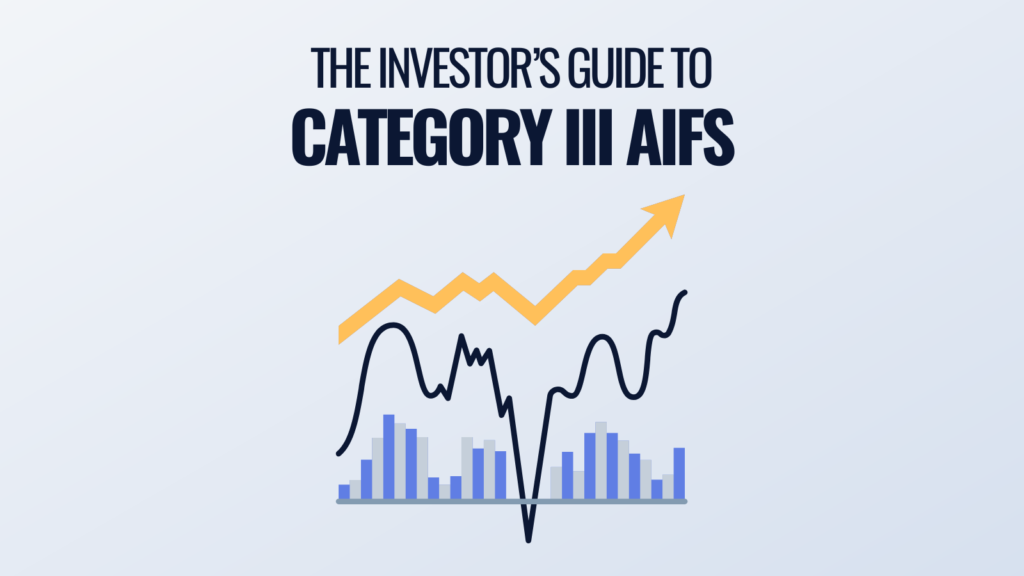Alternative Investment Funds (AIFs) are privately pooled investment vehicles regulated by SEBI, investing in venture capital, private equity, hedge funds, real estate, and derivatives. They can be structured as trusts, companies, or LLPs. AIFs are categorized into Category I (early-stage and infrastructure investments), Category II (private equity and pre-IPO investments), and Category III (listed company shares with long-only or long-short strategies).
- Understanding Category III AIFs
- Types of Category III AIFs
- Taxation of Category III AIFs
- Regulatory Framework and Leverage
- Who Should Invest in Category III AIFs?
- Conclusion
Alternative Investment Funds (AIFs) in India have attracted significant interest from high-net-worth individuals (HNIs) and institutional investors looking for diverse investment opportunities. Among the three categories designated by the Securities and Exchange Board of India (SEBI), Category III AIFs are distinguishable due to their complicated trading methods and potential for higher returns. Let’s dig into the complexities of Category III AIFs, with an emphasis on Private Investment in Public Equity (PIPE) funds and hedge funds, as well as their kinds, strategies, taxation, and potential investor issues.
(A) Understanding Category III AIFs
These funds use a variety of complex trading strategies, including investments in listed and unlisted derivatives. They use arbitrage, margin trading, and derivative trading to make short-term gains. Unlike Category I and II AIFs, these funds can have open-ended or closed-ended structures, giving investors more options for investment and redemption.
(B) Types of Category III AIFs

Within Category III, two prominent types of funds are:
1) Private Investment in Public Equity (PIPE) Funds
PIPE funds invest in publicly traded firms and frequently buy shares at a discount. Because of the reduced paperwork and administrative procedures, these investments are often easier to complete than secondary market deals. PIPE investments give companies with fast capital infusions while allowing investors to profit from lower share prices.
2) Hedge Funds
Hedge funds are financial entities that attract private investors and use a wide range of trading and investment tactics across domestic and international markets. They actively manage their portfolios, which include both long and short positions in traditional securities which includes:
- Stocks from public and unlisted corporations,
- Derivatives,
- Complicated or structured products,
- and AIF units.
Hedge Funds Investment Strategies : Long-Only vs. Long-Short
Long-Only Funds
Long-only fund managers invest in stocks with the expectation that their value will appreciate over time, similar to traditional equity mutual funds. They focus on long-term capital appreciation without employing short-selling or leverage strategies.

Long-Short Funds
Long-short funds hold both long positions (purchasing securities that are expected to increase in value) and short positions (selling positions that are expected to decline in value). This method enables fund managers to hedge against market volatility while pursuing absolute returns, regardless of market conditions.

(C) Taxation of Category III AIFs
Category III AIFs do not benefit from pass-through taxation like Category I and II AIFs, hence, their revenue is taxed at the fund level based on its structure and income type. They are typically formed as trusts and, like family trusts, are taxed under Sections 161 to 164 of the Income Tax Act. If the trust has identifiable beneficiaries with a defined share, the trustee is taxed in a representative capacity, ensuring that any tax breaks (such as treaty exemptions) are still available to investors.
However, if the AIF has a structure of a company or partnership, it will have to pay income tax at the entity level, and distribution tax to investors is in accordance with the Act’s applicable requirements.
(D) Regulatory Framework and Leverage
SEBI allows Category III AIFs to use leverage equal to two times their net asset value (NAV). A fund having a corpus of ₹100 crore can hold positions worth up to ₹200 crore. Funds must disclose to investors their overall leverage level, leverage sources, and associated risks.
(E) Who Should Invest in Category III AIFs?
Investment in Category III AIFs is suitable for:
- High-Net-Worth Individuals: Seeking advanced investing opportunities with a higher risk-reward potential.
- Experienced investors: Individuals with a thorough understanding of market dynamics and risk management.
Given the complicated techniques and greater risk profile, prospective investors should do extensive due research and contact with financial professionals before committing funds.
(F) Conclusion
Category III AIFs provide skilled investors with complex trading methods and the potential for significant returns. However, they are more difficult and risky. Understanding the many kinds, strategies, regulatory environment, and tax implications is critical for making sound investing decisions. Engaging with financial professionals can provide significant insights and advice based on individual investing goals and risk tolerance.
Drop us your query at – info@pawealth.in or Visit pawealth.in
References: PMS Bazaar, Industry’s Publications, News Publications, PMS Company, APMI, SEBI.
Disclaimer: The report only represents personal opinions and views of the author. No part of the report should be considered as recommendation for buying/selling any stock. Thus, the report & references mentioned are only for the information of the readers about the industry stated.
Most successful stock advisors in India | Ludhiana Stock Market Tips | Stock Market Experts in Ludhiana | Top stock advisors in India | Best Stock Advisors in Gurugram | Investment Consultants in Ludhiana | Top Stock Brokers in Gurugram | Best stock advisors in India | Ludhiana Stock Advisors SEBI | Stock Consultants in Ludhiana | AMFI registered distributor | Amfi registered mutual fund | Be a mutual fund distributor | Top stock advisors in India | Top stock advisory services in India | Best Stock Advisors in Bangalore




